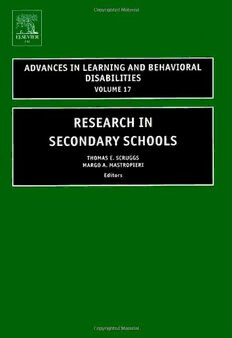
Research in Secondary Schools, Volume 17 (Advances in Learning and Behavioral Disabilities) PDF
333 Pages·2004·1.535 MB·English
Most books are stored in the elastic cloud where traffic is expensive. For this reason, we have a limit on daily download.
Preview Research in Secondary Schools, Volume 17 (Advances in Learning and Behavioral Disabilities)
Description:
Secondary education of students with learning and behavioral disabilities is an issue of great importance. Unlike elementary schools, secondary schools require substantially more independent functioning, assume the effective use of student planning and study skills, and often lack the classes in basic skills needed by some learners. Further, new developments in state high-stakes testing have increased the demands on content knowledge, and have decreased the availability of vocationally oriented programs. In this volume, several topics of relevance to secondary schools are considered by leading scholars, in reviews of recent research and new investigations with original data. Included in the volume are reviews of recent research on the efficacy of self-management techniques; the utility and efficacy of homework assignments; treatments for secondary students with autism; interventions on content-area learning, including English, science, math, and social studies; the effects of teacher licensure on teaching competence; dynamic assessment of working memory; and uses of technology in secondary education programs for students with learning and behavioral disabilities. In addition, original research is presented in areas of problem solving in algebra; effectiveness of co-teaching in secondary classrooms; and the interaction of depression and self-regulation. This book is intended for interested professionals and practitioners; researchers in learning and behavioral disabilities; and graduate students in psychology, education, and special education, particularly those concerned with the issues of learning and behavior problems in secondary schools.
See more
The list of books you might like
Most books are stored in the elastic cloud where traffic is expensive. For this reason, we have a limit on daily download.
